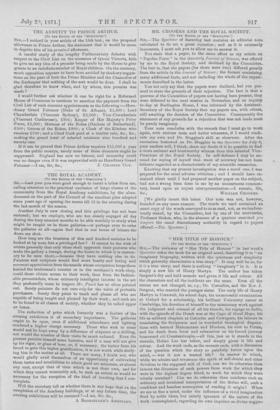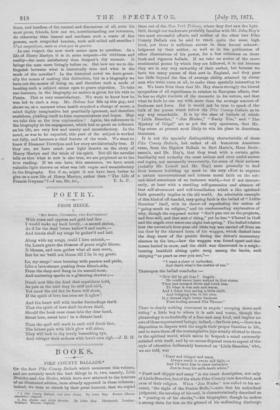"HER TITLE OF HONOUR."
(TO THE EDITOR OT THE "SPROTAT0R.1
STE,—The reviewer of "Her Title of Honour" in last week's Spectator takes the book for an original novel, describing it as "an imaginary biography, written with the quietness and simplicity which generally characterize a true story." It may well be so, for it is a true story, and there is nothing " imaginary " in it. It is simply a new life of Henry Martyn. The author has taken Sargent's dry and bald memoir and given it life and colour. All the characters and all the incidents are the same.. Even all the names are not changed, as, e.g., Dr. Cornelius, and the Rev. J. Sargent, who married the younger sister. The early life of Henry Martyn in Cornwall, his school days, his unsuccessful examination at Oxford for a scholarship, his brilliant University career at Cambridge, his devotion of himself to the missionary work against the judgment and counsel of all his friends, his voyage to India, with the episode of the Dutch war at the Cape of Good Hope, his life as military chaplain at Calcutta and Cawnpore, his labours in translating the Scriptures and in wonderful theological disputa- tions with learned Mahometans and Hindoos, his visit to Persia, and his death from fever and exhaustion on his forced journey homeward via Constantinople,—all this, just as it stands in the memoir, Holme Lee has taken, and simply given it life and colour. And the work ends, as the memoir ends, with a discussion of the question which the story so painfully forces upon the mind, — was it not a wasted life ? In answer to which, while we admire and reverence the spirit of self-denial and utter devotion to the supposed will of God, can we do otherwise than lament the diversion of such powers from work for which they were in the highest degree fitted, to work for which they were utterly unsuited? Can we do otherwise than condemn such an arbitrary and irrational interpretation of the divine will, such a. confident and baseless assumption of reading it aright? When we see so fine a mind, under the influence of a vivid imagination fired by noble ideas, but utterly ignorant of the nature of the work contemplated, regarding its own impulses as divine sugges-
tious, and heedless of the counsel and dissuasions of all, even his most pious, friends, how can we, notwithstanding our reverence, do otherwise than lament and condemn such a waste of flue powers, such misguided heroism, such self-willed self-sacrifice ? Cest magnijique, mais ce n'est pas la guerre.
In one respect the new work seems open to question. As a life of Henry Martyn it is in some respects—its vividness and reality—far more satisfactory than Sargent's dry memoir. It brings the man more livingly before us. But how are we to dis- tinguish between what is historically true and what is the work of the novelist? In the historical novel we have gener- ally the means of making this distinction, but in a biography we have not the means of doing so, and therefore such a mode of treating such a subject seems open to grave objection. To take one instance, in the biography no motive is given for his visit to Persia. This is very unsatisfactory. We want to know how he was led to such a step. Mr. Heinle Lee fills up this gap, and shows us, at a moment when health required a change of scene, a mind highly imaginative but practically ignorant, and therefore credulous, yielding itself to false representations and hopes. May we take this as the true explanation? Again, the references in the biography to hie engagement, which had so great an influence on his life, are very few and scanty and unsatisfactory. In the novel, as was to be expected, this part of the subject is worked out fully, and becomes a chief feature of the work. We want to know if Eleanour Trevelyan and her story are historically true. If they are, we have much new light thrown on the story of Henry Martyn and the trials of his spirit. But till the novelist tells us that what is new is also true, we are perplexed as to the true reading. If we can have this assurance, we have much valuable light thrown on what was left vague and unsatisfactory in the biography. But if so, might it not have been better to give us a new life of Henry Martyn, rather than "The Life of Francis Gwynue "?—I am, Sir, &c., T. L. I'.

































 Previous page
Previous page